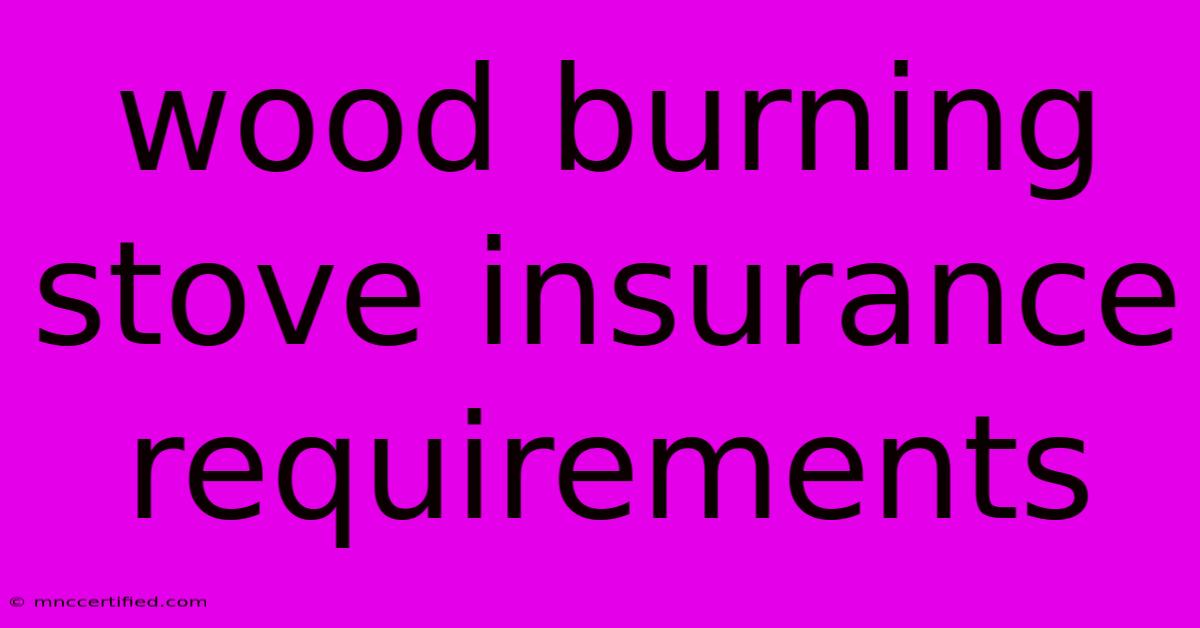Wood Burning Stove Insurance Requirements

Table of Contents
Keeping Your Home and Stove Safe: Wood Burning Stove Insurance Requirements
A wood burning stove can add warmth, ambiance, and even a sense of nostalgia to your home. But, like any other appliance, it comes with its own set of risks. To ensure you're covered in the event of an accident or fire, understanding your wood burning stove insurance requirements is crucial.
Why You Need Specific Insurance Coverage
While your standard homeowner's insurance policy might cover some aspects of a wood burning stove, it often falls short when it comes to the specific risks associated with them. Here's why you need dedicated wood burning stove insurance:
- Fire Risks: Wood burning stoves pose a fire hazard if not properly maintained and operated. A dedicated policy can cover damages caused by fire, smoke, and soot.
- Liability: Accidents can happen. If your stove malfunctions and causes damage to your property or someone else's, you'll need liability coverage to protect you from financial repercussions.
- Equipment Damage: Your stove itself is an investment. Dedicated coverage protects you from loss or damage due to accidents, malfunctions, or even theft.
What to Look for in Your Policy
When researching wood burning stove insurance, here are some key things to consider:
- Coverage Limits: Ensure your policy offers sufficient coverage for the value of your stove and any potential damages it might cause.
- Deductibles: Choose a deductible you can afford to pay in the event of a claim. Higher deductibles usually result in lower premiums.
- Exclusions: Understand what your policy doesn't cover, like damage caused by improper installation or negligence.
- Inspections: Some insurers require regular inspections of your stove to ensure safety and compliance.
Key Considerations for Your Stove
Besides the general insurance aspects, consider these factors related to your stove:
- Stove Type: Different types of stoves, like pellet stoves or wood-burning fireplaces, may have different insurance requirements.
- Age: Older stoves might require more frequent inspections and potentially higher premiums.
- Installation: Professional installation and regular maintenance are crucial for safety and can impact your insurance rates.
Getting the Right Coverage
- Talk to Your Insurer: Start by discussing your needs with your current homeowner's insurance provider. They may offer specialized coverage options for wood burning stoves.
- Shop Around: Get quotes from multiple insurers to compare coverage and rates.
- Read the Fine Print: Thoroughly review the policy details, including exclusions and limitations, before making a decision.
Maintaining Safety for Peace of Mind
Remember, insurance is a safety net, but prevention is the best protection. Here are some tips to reduce the risk of accidents:
- Proper Installation: Ensure your stove is installed by a qualified professional and meets local building codes.
- Regular Maintenance: Schedule regular cleaning and inspections to ensure your stove is functioning safely.
- Safe Operation: Follow manufacturer instructions and use your stove responsibly, avoiding overloading and leaving it unattended.
By taking these steps, you can ensure your home and your stove are safe and that you have the appropriate insurance coverage to protect you in case of unforeseen events.

Thank you for visiting our website wich cover about Wood Burning Stove Insurance Requirements. We hope the information provided has been useful to you. Feel free to contact us if you have any questions or need further assistance. See you next time and dont miss to bookmark.
Featured Posts
-
Can You Buy A Motorcycle Without Insurance
Nov 07, 2024
-
Does Homeowners Insurance Cover Hotel Stay
Nov 07, 2024
-
Trump Inauguration Date Ceremony And More
Nov 07, 2024
-
German Bundesliga Bayern Vs Benfica Predictions And Odds
Nov 07, 2024
-
Millwall Boss Praises Leeds United X Factor
Nov 07, 2024